Roberts A.D. The Cambridge History of Africa, Volume 7: from 1905 to 1940
Подождите немного. Документ загружается.

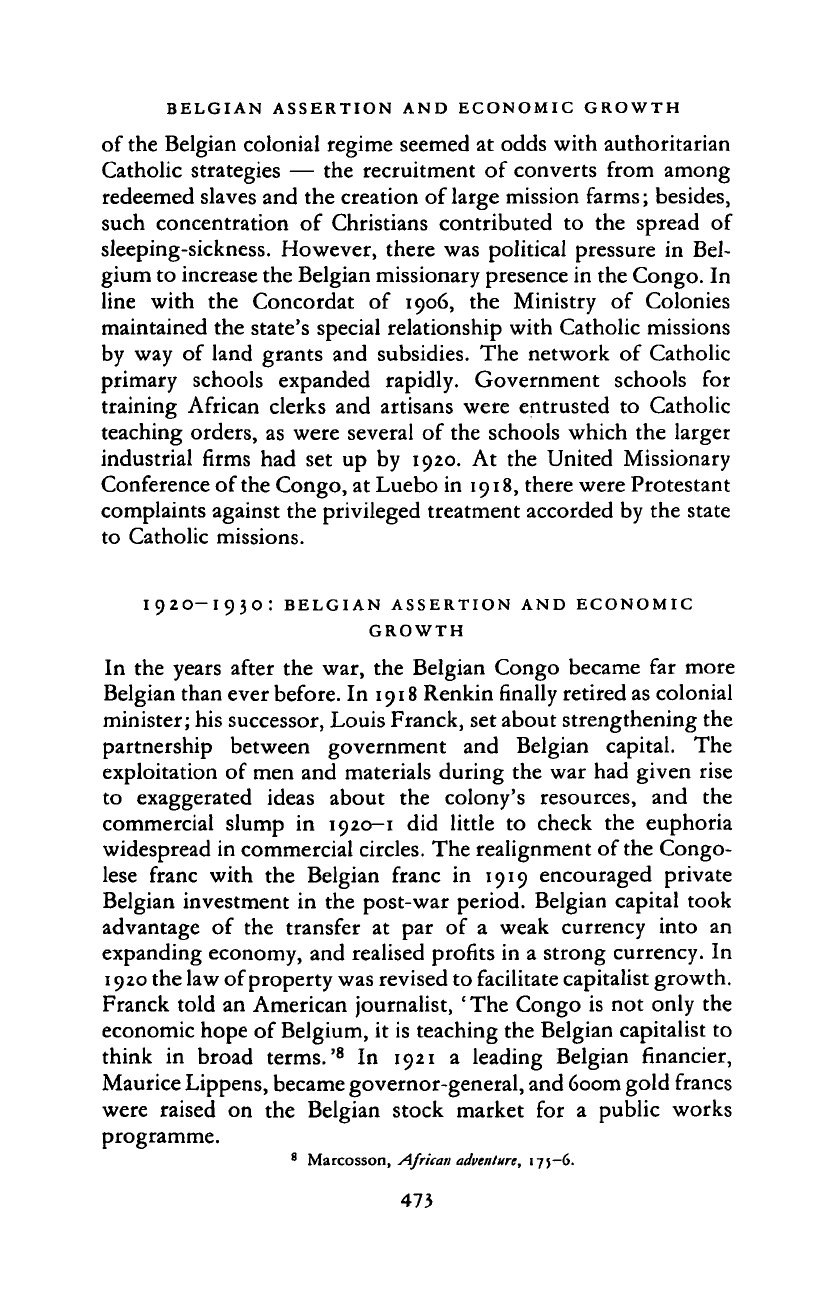
BELGIAN ASSERTION AND ECONOMIC GROWTH
of the Belgian colonial regime seemed at odds with authoritarian
Catholic strategies — the recruitment
of
converts from among
redeemed slaves and the creation of large mission farms; besides,
such concentration
of
Christians contributed
to the
spread
of
sleeping-sickness. However, there was political pressure
in
Bel-
gium to increase the Belgian missionary presence in the Congo. In
line with
the
Concordat
of
1906,
the
Ministry
of
Colonies
maintained the state's special relationship with Catholic missions
by way
of
land grants and subsidies. The network
of
Catholic
primary schools expanded rapidly. Government schools
for
training African clerks and artisans were entrusted
to
Catholic
teaching orders, as were several
of
the schools which the larger
industrial firms had
set
up by 1920.
At
the United Missionary
Conference of the Congo, at Luebo in 1918, there were Protestant
complaints against the privileged treatment accorded by the state
to Catholic missions.
1920-1930: BELGIAN ASSERTION AND ECONOMIC
GROWTH
In the years after the war, the Belgian Congo became
far
more
Belgian than ever before. In 1918 Renkin finally retired as colonial
minister; his successor, Louis Franck, set about strengthening the
partnership between government
and
Belgian capital.
The
exploitation of men and materials during the war had given rise
to exaggerated ideas about
the
colony's resources,
and the
commercial slump
in
1920-1
did
little
to
check
the
euphoria
widespread in commercial circles. The realignment of the Congo-
lese franc with
the
Belgian franc
in
1919 encouraged private
Belgian investment in the post-war period. Belgian capital took
advantage
of
the transfer
at par of a
weak currency into
an
expanding economy, and realised profits in a strong currency. In
1920 the law of property was revised to facilitate capitalist growth.
Franck told an American journalist, 'The Congo is not only the
economic hope of Belgium, it is teaching the Belgian capitalist to
think
in
broad terms.'
8
In
1921
a
leading Belgian financier,
Maurice Lippens, became governor-general, and 600m gold francs
were raised
on the
Belgian stock market
for a
public works
programme.
8
Marcosson, African
adventure,
175-6.
473
Cambridge Histories Online © Cambridge University Press, 2008
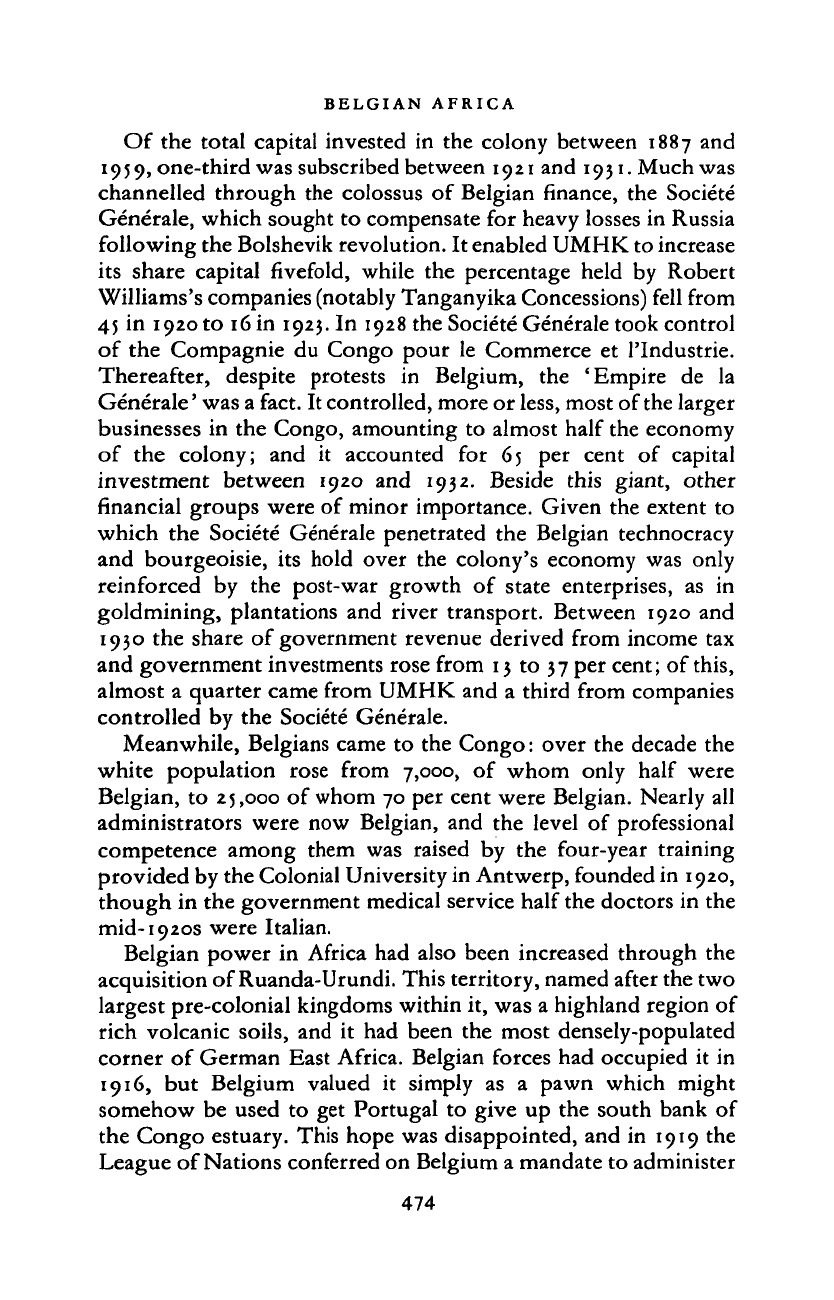
BELGIAN AFRICA
Of the total capital invested in the colony between 1887 and
1959,
one-third was subscribed between 19
21
and 19
31.
Much was
channelled through the colossus of Belgian finance, the Societe
Generale, which sought to compensate for heavy losses in Russia
following the Bolshevik revolution. It enabled UMHK to increase
its share capital fivefold, while the percentage held by Robert
Williams's companies (notably Tanganyika Concessions) fell from
45 in 1920 to
16
in
1925.
In 1928 the Societe Generale took control
of the Compagnie du Congo pour le Commerce
et
l'lndustrie.
Thereafter, despite protests
in
Belgium,
the
'Empire
de la
Generale' was a fact. It controlled, more or less, most of the larger
businesses in the Congo, amounting to almost half the economy
of the colony; and
it
accounted
for 65 per
cent
of
capital
investment between 1920 and 1932. Beside this giant, other
financial groups were of minor importance. Given the extent to
which the Societe Generale penetrated the Belgian technocracy
and bourgeoisie, its hold over the colony's economy was only
reinforced
by
the post-war growth
of
state enterprises,
as in
goldmining, plantations and river transport. Between 1920 and
1930 the share of government revenue derived from income tax
and government investments rose from 13 to
37
per cent; of this,
almost a quarter came from UMHK and a third from companies
controlled by the Societe Generale.
Meanwhile, Belgians came to the Congo: over the decade the
white population rose from 7,000,
of
whom only half were
Belgian, to 25,000 of whom 70 per cent were Belgian. Nearly all
administrators were now Belgian, and the level
of
professional
competence among them was raised
by
the four-year training
provided by the Colonial University in Antwerp, founded in 1920,
though in the government medical service half the doctors in the
mid-1920s were Italian.
Belgian power in Africa had also been increased through the
acquisition of Ruanda-Urundi. This territory, named after the two
largest pre-colonial kingdoms within it, was a highland region of
rich volcanic soils, and
it
had been the most densely-populated
corner of German East Africa. Belgian forces had occupied it in
1916,
but
Belgium valued
it
simply
as a
pawn which might
somehow be used to get Portugal to give up the south bank of
the Congo estuary. This hope was disappointed, and in 1919 the
League of Nations conferred on Belgium a mandate to administer
474
Cambridge Histories Online © Cambridge University Press, 2008
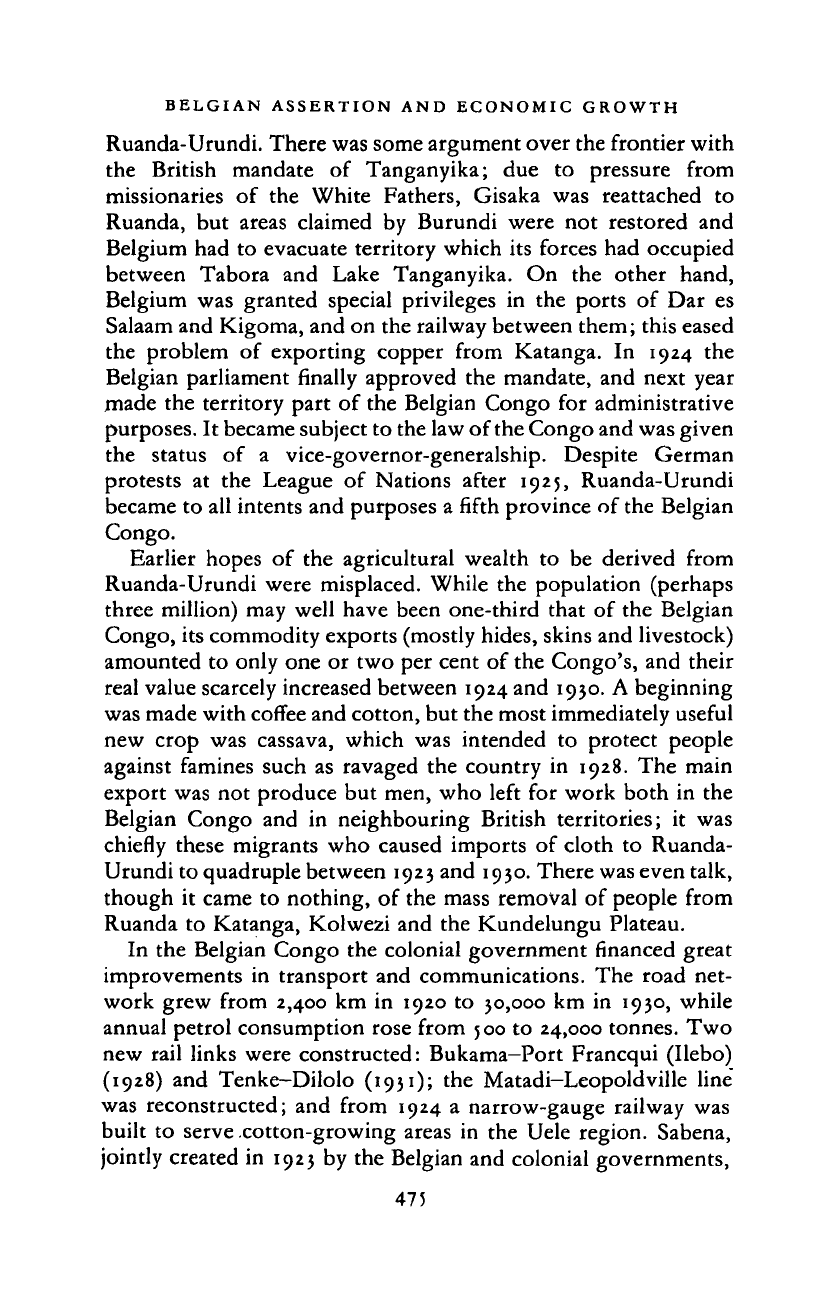
BELGIAN ASSERTION AND ECONOMIC GROWTH
Ruanda-Urundi. There was some argument over the frontier with
the British mandate
of
Tanganyika;
due to
pressure from
missionaries
of
the White Fathers, Gisaka was reattached
to
Ruanda, but areas claimed
by
Burundi were not restored and
Belgium had to evacuate territory which its forces had occupied
between Tabora
and
Lake Tanganyika.
On the
other hand,
Belgium was granted special privileges
in
the ports
of
Dar
es
Salaam and Kigoma, and on the railway between them; this eased
the problem
of
exporting copper from Katanga.
In
1924
the
Belgian parliament finally approved the mandate, and next year
made the territory part of the Belgian Congo for administrative
purposes. It became subject to the law of the Congo and was given
the status
of a
vice-governor-generalship. Despite German
protests
at the
League
of
Nations after 1925, Ruanda-Urundi
became to all intents and purposes a fifth province of the Belgian
Congo.
Earlier hopes
of
the agricultural wealth
to be
derived from
Ruanda-Urundi were misplaced. While the population (perhaps
three million) may well have been one-third that of the Belgian
Congo, its commodity exports (mostly hides, skins and livestock)
amounted to only one or two per cent of the Congo's, and their
real value scarcely increased between 1924 and 1930. A beginning
was made with coffee and cotton, but the most immediately useful
new crop was cassava, which was intended
to
protect people
against famines such as ravaged the country
in
1928. The main
export was not produce but men, who left for work both in the
Belgian Congo and
in
neighbouring British territories;
it
was
chiefly these migrants who caused imports
of
cloth
to
Ruanda-
Urundi to quadruple between 1923 and 1930. There was even talk,
though
it
came to nothing, of the mass removal of people from
Ruanda to Katanga, Kolwezi and the Kundelungu Plateau.
In the Belgian Congo the colonial government financed great
improvements
in
transport and communications. The road net-
work grew from 2,400 km in 1920 to 30,000 km
in
1930, while
annual petrol consumption rose from 500 to 24,000 tonnes. Two
new rail links were constructed: Bukama-Port Francqui (Ilebo)
(1928) and Tenke-Dilolo (1931); the Matadi-Leopoldville line
was reconstructed; and from 1924
a
narrow-gauge railway was
built to serve cotton-growing areas
in
the Uele region. Sabena,
jointly created in 1923 by the Belgian and colonial governments,
475
Cambridge Histories Online © Cambridge University Press, 2008
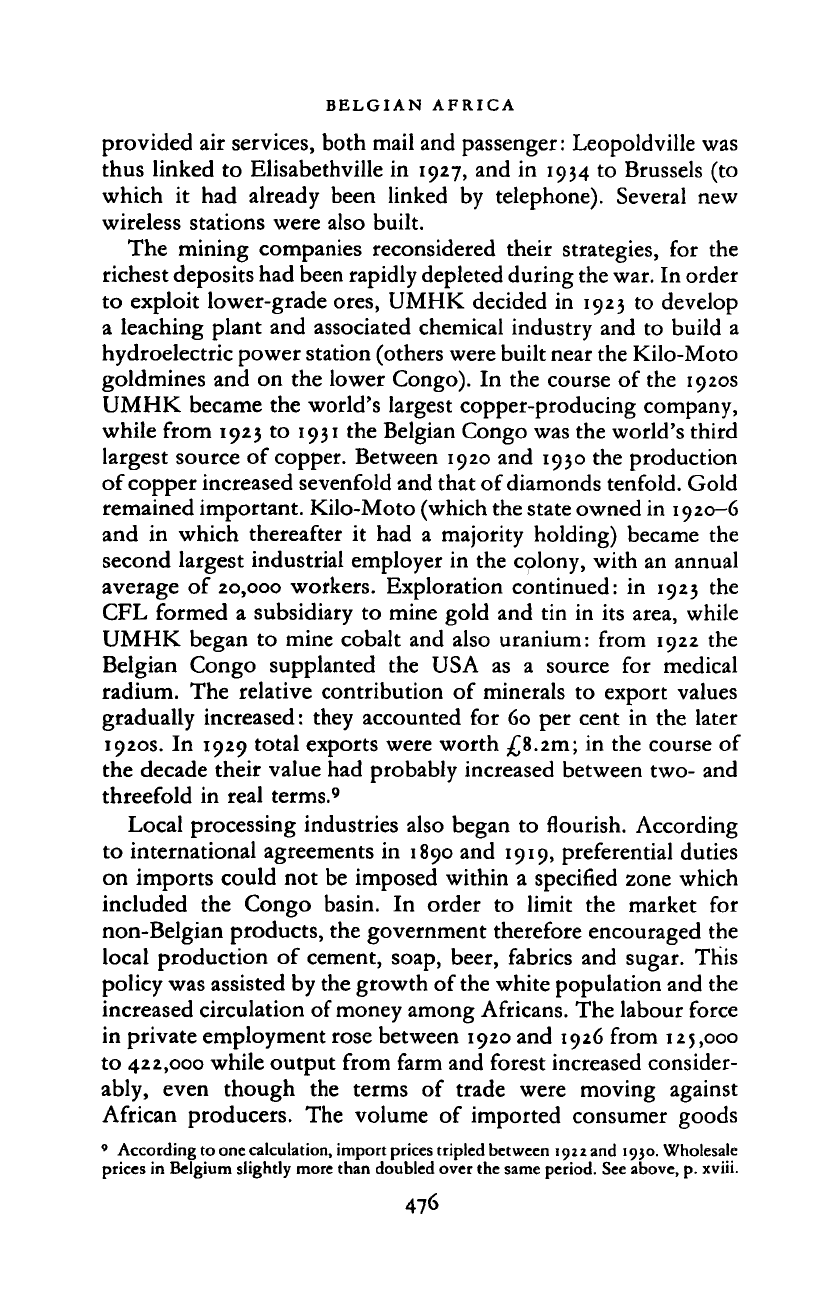
BELGIAN AFRICA
provided air services, both mail and passenger: Leopoldville was
thus linked to Elisabethville in 1927, and in 1934 to Brussels (to
which it had already been linked by telephone). Several new
wireless stations were also built.
The mining companies reconsidered their strategies, for the
richest deposits had been rapidly depleted during the war. In order
to exploit lower-grade ores, UMHK decided in 1923 to develop
a leaching plant and associated chemical industry and to build a
hydroelectric power station (others were built near the Kilo-Moto
goldmines and on the lower Congo). In the course of the 1920s
UMHK became the world's largest copper-producing company,
while from 1923 to 1931 the Belgian Congo was the world's third
largest source of copper. Between 1920 and 1930 the production
of copper increased sevenfold and that of diamonds tenfold. Gold
remained important. Kilo-Moto (which the state owned in 1920-6
and in which thereafter it had a majority holding) became the
second largest industrial employer in the colony, with an annual
average of 20,000 workers. Exploration continued: in 1923 the
CFL formed a subsidiary to mine gold and tin in its area, while
UMHK began to mine cobalt and also uranium: from 1922 the
Belgian Congo supplanted the USA as a source for medical
radium. The relative contribution of minerals to export values
gradually increased: they accounted for 60 per cent in the later
1920s. In 1929 total exports were worth £8.2m; in the course of
the decade their value had probably increased between two- and
threefold in real terms.
9
Local processing industries also began to flourish. According
to international agreements in 1890 and 1919, preferential duties
on imports could not be imposed within a specified zone which
included the Congo basin. In order to limit the market for
non-Belgian products, the government therefore encouraged the
local production of cement, soap, beer, fabrics and sugar. This
policy was assisted by the growth of the white population and the
increased circulation of money among Africans. The labour force
in private employment rose between 1920 and 1926 from 125,000
to 422,000 while output from farm and forest increased consider-
ably, even though the terms of trade were moving against
African producers. The volume of imported consumer goods
9
According to one calculation, import prices tripled between
1922
and 1950. Wholesale
prices in Belgium slightly more than doubled over the same period. See above, p. xviii.
476
Cambridge Histories Online © Cambridge University Press, 2008
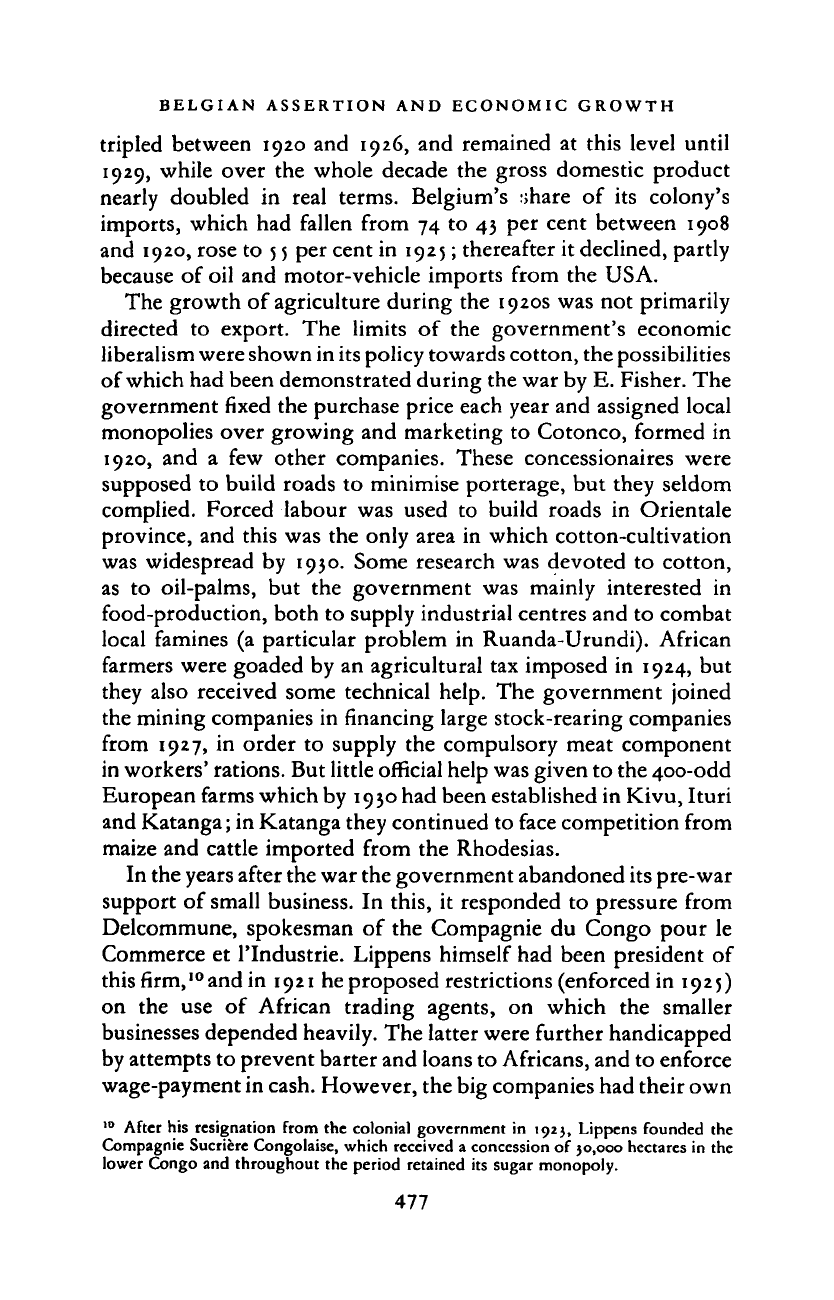
BELGIAN ASSERTION AND ECONOMIC GROWTH
tripled between 1920
and
1926,
and
remained
at
this level until
1929,
while over
the
whole decade
the
gross domestic product
nearly doubled
in
real terms. Belgium's share
of its
colony's
imports, which
had
fallen from
74 to
43
per
cent between
1908
and 1920, rose to
5 5
per cent in 1925; thereafter
it
declined, partly
because
of
oil
and
motor-vehicle imports from
the
USA.
The growth
of
agriculture during
the
1920s was
not
primarily
directed
to
export.
The
limits
of the
government's economic
liberalism were shown in its policy towards cotton, the possibilities
of which had been demonstrated during the war by E. Fisher. The
government fixed the purchase price each year and assigned local
monopolies over growing
and
marketing
to
Cotonco, formed
in
1920,
and a few
other companies. These concessionaires were
supposed
to
build roads
to
minimise porterage,
but
they seldom
complied. Forced labour
was
used
to
build roads
in
Orientale
province,
and
this was
the
only area
in
which cotton-cultivation
was widespread
by
1930. Some research was devoted
to
cotton,
as
to
oil-palms,
but the
government
was
mainly interested
in
food-production, both
to
supply industrial centres and
to
combat
local famines
(a
particular problem
in
Ruanda-Urundi). African
farmers were goaded
by an
agricultural tax imposed
in
1924,
but
they also received some technical help.
The
government joined
the mining companies
in
financing large stock-rearing companies
from 1927,
in
order
to
supply
the
compulsory meat component
in workers' rations. But little official help was given to the 400-odd
European farms which by
1930
had been established in Kivu, Ituri
and Katanga; in Katanga they continued to face competition from
maize and cattle imported from
the
Rhodesias.
In the years after the war the government abandoned its pre-war
support
of
small business.
In
this,
it
responded
to
pressure from
Delcommune, spokesman
of
the Compagnie
du
Congo pour
le
Commerce
et
l'lndustrie. Lippens himself had been president
of
this firm,
10
and in 1921 he proposed restrictions (enforced in 1925)
on
the use of
African trading agents,
on
which
the
smaller
businesses depended heavily. The latter were further handicapped
by attempts to prevent barter and loans to Africans, and to enforce
wage-payment in cash. However, the big companies had their own
10
After his resignation from
the
colonial government
in
192), Lippens founded
the
Compagnie Sucriere Congolaise, which received a concession
of
30,000 hectares in
the
lower Congo and throughout the period retained
its
sugar monopoly.
477
Cambridge Histories Online © Cambridge University Press, 2008
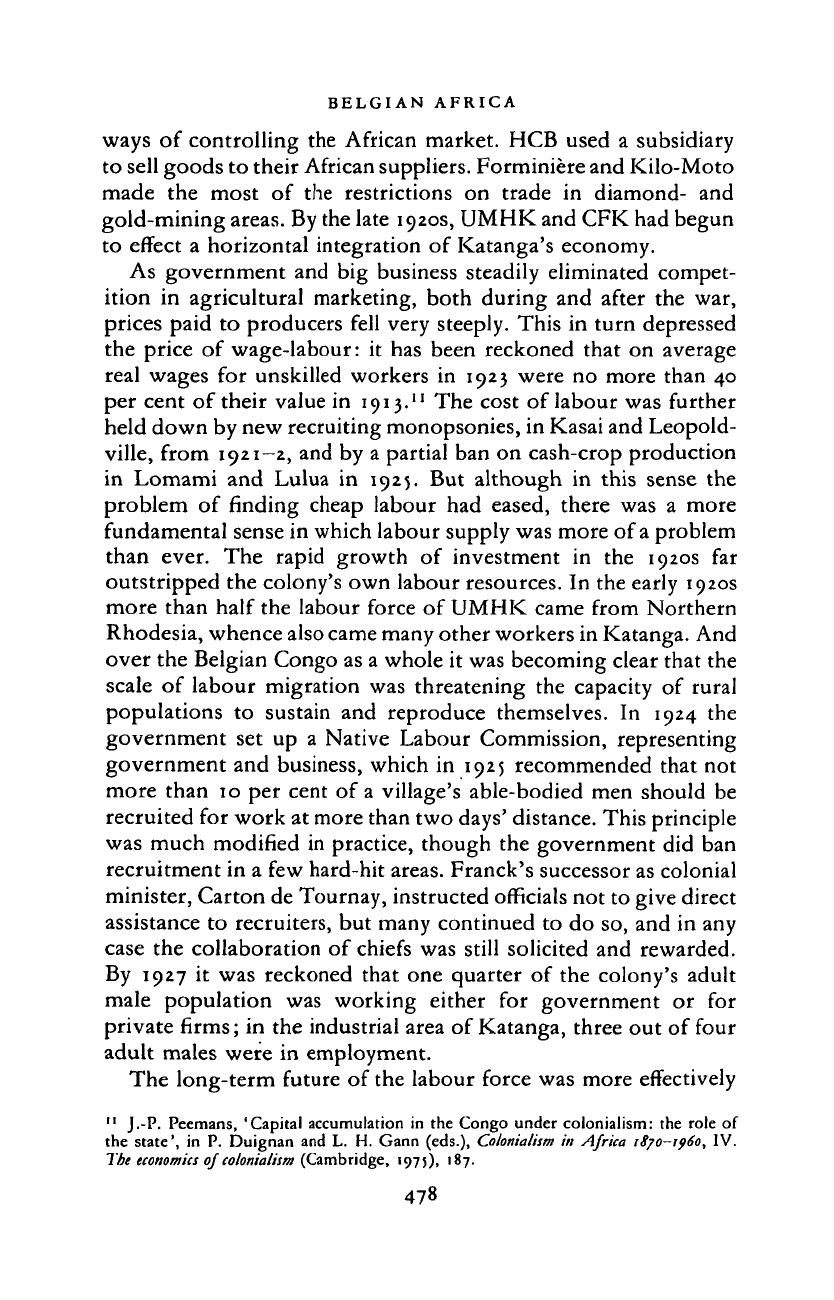
BELGIAN AFRICA
ways
of
controlling the African market. HCB used
a
subsidiary
to sell goods to their African suppliers. Forminiere and Kilo-Moto
made
the
most
of the
restrictions
on
trade
in
diamond-
and
gold-mining areas. By the late 1920s, UMHK and CFK had begun
to effect
a
horizontal integration
of
Katanga's economy.
As government and big business steadily eliminated compet-
ition
in
agricultural marketing, both during and after
the
war,
prices paid
to
producers fell very steeply. This
in
turn depressed
the price
of
wage-labour:
it
has been reckoned that
on
average
real wages
for
unskilled workers
in
1923 were
no
more than
40
per cent
of
their value in
1913."
The cost
of
labour was further
held down by new recruiting monopsonies, in Kasai and Leopold-
ville,
from 1921-2, and by a partial ban on cash-crop production
in Lomami
and
Lulua
in
1925. But although
in
this sense
the
problem
of
finding cheap labour
had
eased, there was
a
more
fundamental sense in which labour supply was more of a problem
than ever.
The
rapid growth
of
investment
in the
1920s
far
outstripped the colony's own labour resources. In the early 1920s
more than half the labour force
of
UMHK came from Northern
Rhodesia, whence also came many other workers in Katanga. And
over the Belgian Congo as a whole
it
was becoming clear that the
scale
of
labour migration was threatening
the
capacity
of
rural
populations
to
sustain
and
reproduce themselves.
In
1924
the
government
set up a
Native Labour Commission, representing
government and business, which
in
1925 recommended that not
more than 10 per cent
of
a village's able-bodied men should
be
recruited for work at more than two days' distance. This principle
was much modified in practice, though the government did ban
recruitment in a few hard-hit areas. Franck's successor as colonial
minister, Carton de Tournay, instructed officials not to give direct
assistance
to
recruiters, but many continued to do so, and in any
case the collaboration
of
chiefs was still solicited and rewarded.
By 1927
it
was reckoned that one quarter
of
the colony's adult
male population
was
working either
for
government
or for
private firms;
in
the industrial area of Katanga, three out of four
adult males were in employment.
The long-term future of the labour force was more effectively
11
J.-P. Peemans, 'Capital accumulation
in
the Congo under colonialism: the role
of
the state',
in P.
Duignan and
L. H.
Gann (eds.),
Colonialism
in Africa rS/o-/?6o,
IV.
Tie
economics
of
colonialism
(Cambridge, 1975),
187.
478
Cambridge Histories Online © Cambridge University Press, 2008
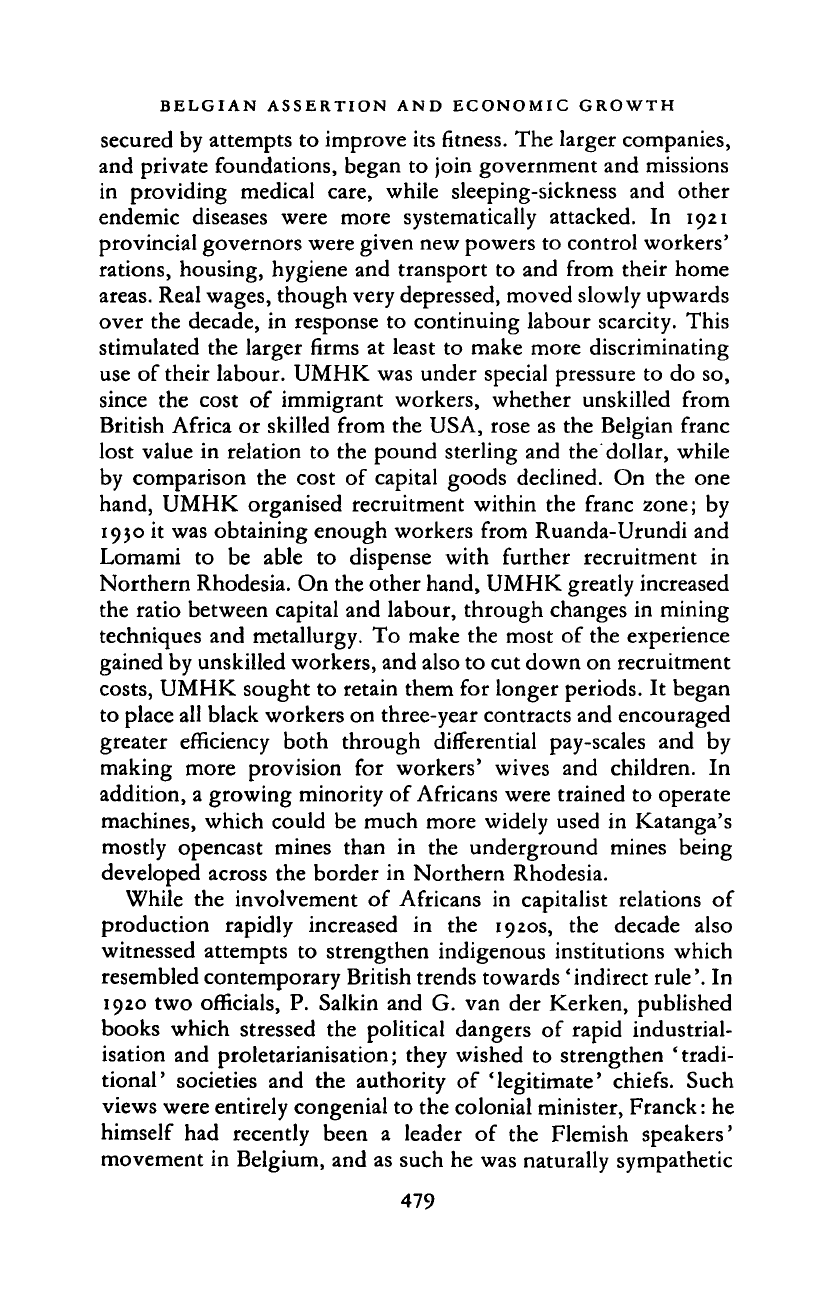
BELGIAN ASSERTION AND ECONOMIC GROWTH
secured by attempts to improve its fitness. The larger companies,
and private foundations, began to join government and missions
in providing medical care, while sleeping-sickness
and
other
endemic diseases were more systematically attacked.
In 1921
provincial governors were given new powers to control workers'
rations, housing, hygiene and transport to and from their home
areas.
Real wages, though very depressed, moved slowly upwards
over the decade, in response to continuing labour scarcity. This
stimulated the larger firms at least to make more discriminating
use of their labour. UMHK was under special pressure to do so,
since the cost
of
immigrant workers, whether unskilled from
British Africa or skilled from the USA, rose as the Belgian franc
lost value in relation to the pound sterling and the dollar, while
by comparison the cost
of
capital goods declined. On the one
hand, UMHK organised recruitment within the franc zone;
by
1930 it was obtaining enough workers from Ruanda-Urundi and
Lomami
to be
able
to
dispense with further recruitment
in
Northern Rhodesia. On the other hand, UMHK greatly increased
the ratio between capital and labour, through changes in mining
techniques and metallurgy. To make the most of the experience
gained by unskilled workers, and also to cut down on recruitment
costs,
UMHK sought to retain them for longer periods.
It
began
to place all black workers on three-year contracts and encouraged
greater efficiency both through differential pay-scales
and by
making more provision
for
workers' wives
and
children.
In
addition, a growing minority of Africans were trained to operate
machines, which could be much more widely used
in
Katanga's
mostly opencast mines than
in the
underground mines being
developed across the border in Northern Rhodesia.
While the involvement
of
Africans
in
capitalist relations
of
production rapidly increased
in the
1920s,
the
decade also
witnessed attempts
to
strengthen indigenous institutions which
resembled contemporary British trends towards 'indirect rule'. In
1920 two officials, P. Salkin and G. van der Kerken, published
books which stressed the political dangers
of
rapid industrial-
isation and proletarianisation; they wished to strengthen 'tradi-
tional' societies and the authority
of
'legitimate' chiefs. Such
views were entirely congenial to the colonial minister, Franck: he
himself had recently been
a
leader
of
the Flemish speakers'
movement in Belgium, and as such he was naturally sympathetic
479
Cambridge Histories Online © Cambridge University Press, 2008
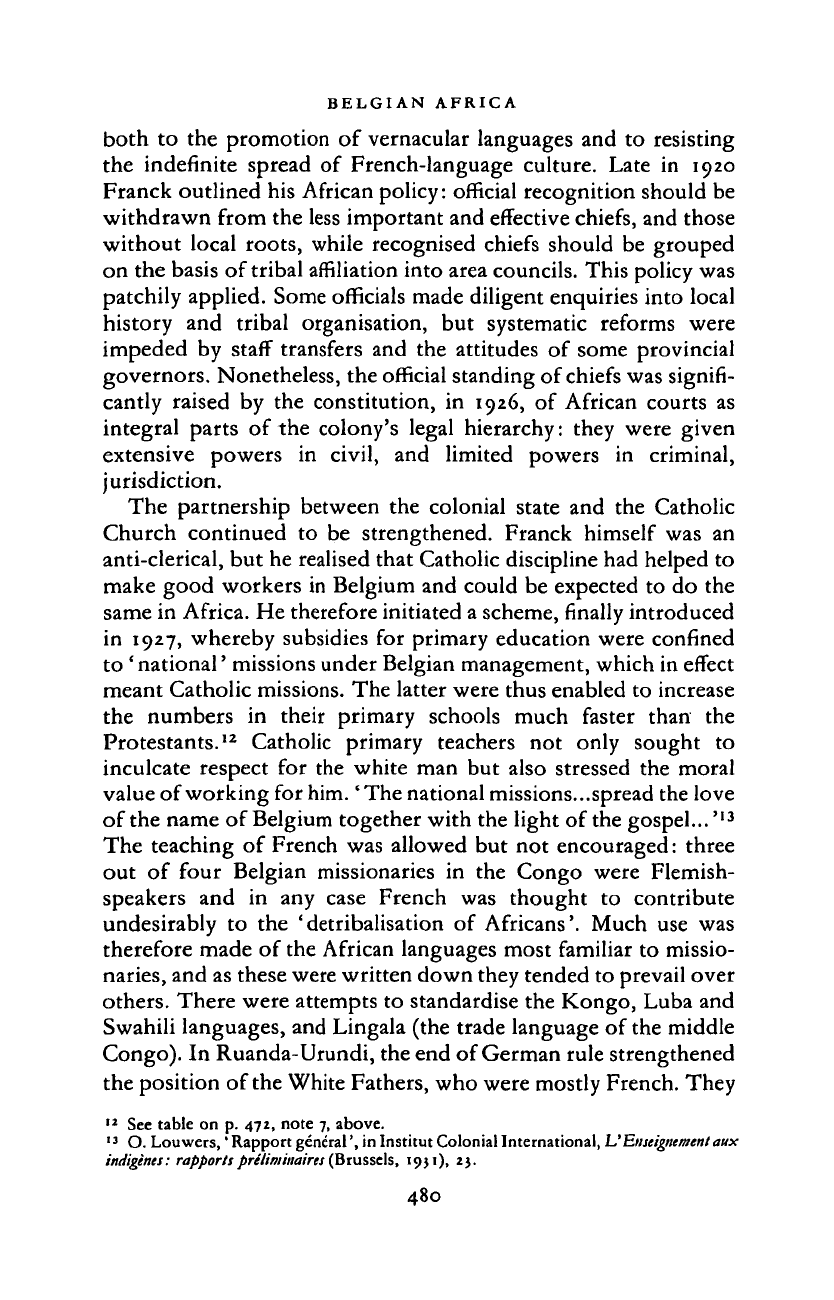
BELGIAN AFRICA
both
to
the promotion
of
vernacular languages and
to
resisting
the indefinite spread
of
French-language culture. Late
in 1920
Franck outlined his African policy: official recognition should be
withdrawn from the less important and effective chiefs, and those
without local roots, while recognised chiefs should be grouped
on the basis of tribal affiliation into area councils. This policy was
patchily applied. Some officials made diligent enquiries into local
history
and
tribal organisation,
but
systematic reforms were
impeded
by
staff transfers and the attitudes
of
some provincial
governors. Nonetheless, the official standing of chiefs was signifi-
cantly raised
by
the constitution,
in
1926,
of
African courts
as
integral parts
of
the colony's legal hierarchy: they were given
extensive powers
in
civil,
and
limited powers
in
criminal,
jurisdiction.
The partnership between the colonial state and the Catholic
Church continued
to be
strengthened. Franck himself was
an
anti-clerical, but he realised that Catholic discipline had helped
to
make good workers in Belgium and could be expected to do the
same in Africa. He therefore initiated a scheme, finally introduced
in 1927, whereby subsidies
for
primary education were confined
to ' national' missions under Belgian management, which in effect
meant Catholic missions. The latter were thus enabled to increase
the numbers
in
their primary schools much faster than
the
Protestants.
12
Catholic primary teachers
not
only sought
to
inculcate respect
for
the white man but also stressed the moral
value of working for him.' The national missions...spread the love
of the name of Belgium together with the light of the gospel...'
13
The teaching
of
French was allowed but not encouraged: three
out
of
four Belgian missionaries
in the
Congo were Flemish-
speakers
and in any
case French
was
thought
to
contribute
undesirably
to the
'detribalisation
of
Africans'. Much use
was
therefore made of the African languages most familiar to missio-
naries, and as these were written down they tended to prevail over
others. There were attempts to standardise the Kongo, Luba and
Swahili languages, and Lingala (the trade language of the middle
Congo). In Ruanda-Urundi, the end of German rule strengthened
the position of the White Fathers, who were mostly French. They
12
See table
on
p. 472, note 7, above.
13
O. Louwers,' Rapport general', in Institut Colonial International,
UEnseignement
aux
indigenes: rapportspriliminaires (Brussels, 1931),
2).
480
Cambridge Histories Online © Cambridge University Press, 2008
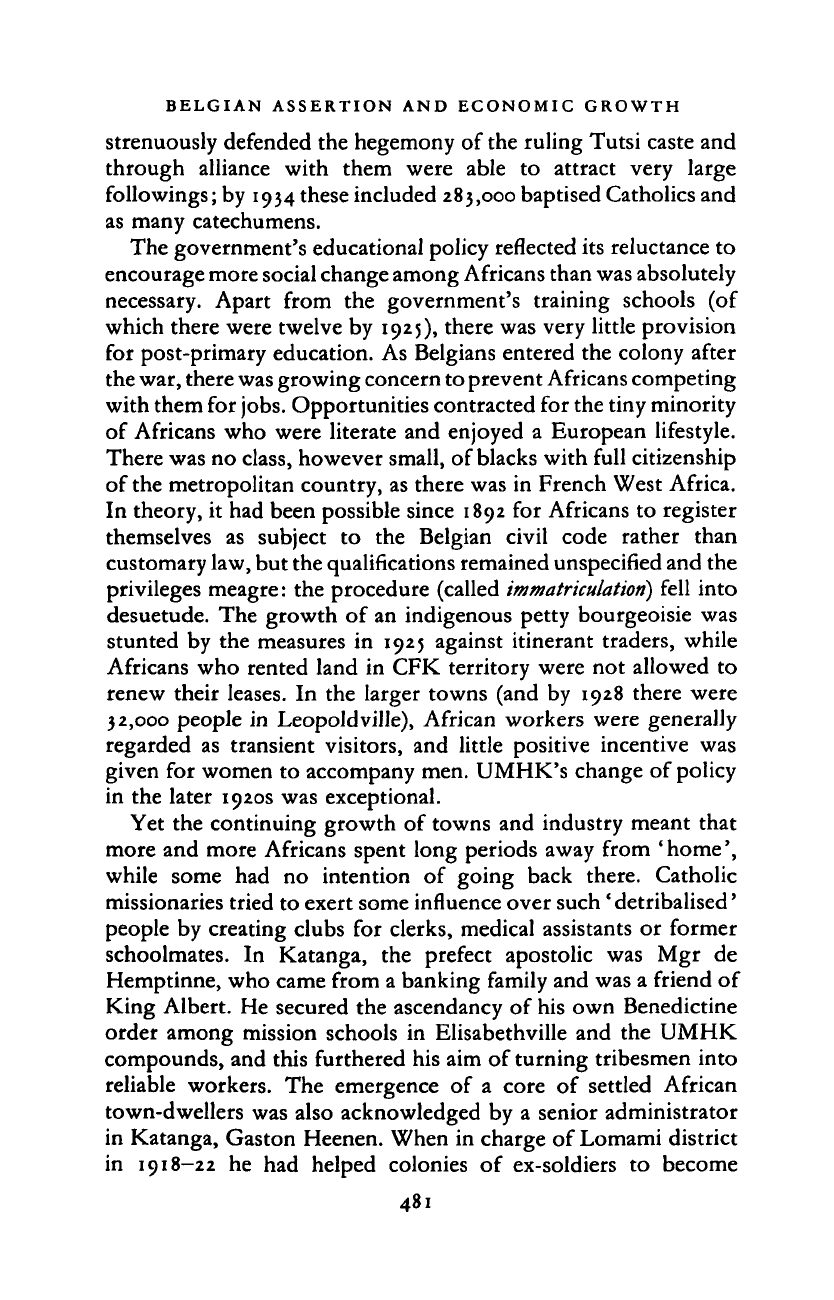
BELGIAN ASSERTION AND ECONOMIC GROWTH
strenuously defended the hegemony of the ruling Tutsi caste and
through alliance with them were able to attract very large
followings; by 1954 these included 283,000 baptised Catholics and
as many catechumens.
The government's educational policy reflected its reluctance to
encourage more social change among Africans than was absolutely
necessary. Apart from the government's training schools (of
which there were twelve by 1925), there was very little provision
for post-primary education. As Belgians entered the colony after
the war, there
was
growing concern to prevent Africans competing
with them for
jobs.
Opportunities contracted for the tiny minority
of Africans who were literate and enjoyed a European lifestyle.
There was no class, however small, of blacks with full citizenship
of the metropolitan country, as there was in French West Africa.
In theory, it had been possible since 1892 for Africans to register
themselves as subject to the Belgian civil code rather than
customary law, but the qualifications remained unspecified and the
privileges meagre: the procedure (called
immatriculatiori)
fell into
desuetude. The growth of an indigenous petty bourgeoisie was
stunted by the measures in 1925 against itinerant traders, while
Africans who rented land in CFK territory were not allowed to
renew their leases. In the larger towns (and by 1928 there were
32,000 people in Leopoldville), African workers were generally
regarded as transient visitors, and little positive incentive was
given for women to accompany men. UMHK's change of policy
in the later 1920s was exceptional.
Yet the continuing growth of towns and industry meant that
more and more Africans spent long periods away from 'home',
while some had no intention of going back there. Catholic
missionaries tried to exert some influence over such ' detribalised'
people by creating clubs for clerks, medical assistants or former
schoolmates. In Katanga, the prefect apostolic was Mgr de
Hemptinne, who came from a banking family and was a friend of
King Albert. He secured the ascendancy of his own Benedictine
order among mission schools in Elisabethville and the UMHK
compounds, and this furthered his aim of turning tribesmen into
reliable workers. The emergence of a core of settled African
town-dwellers was also acknowledged by a senior administrator
in Katanga, Gaston Heenen. When in charge of Lomami district
in 1918-22 he had helped colonies of ex-soldiers to become
481
Cambridge Histories Online © Cambridge University Press, 2008
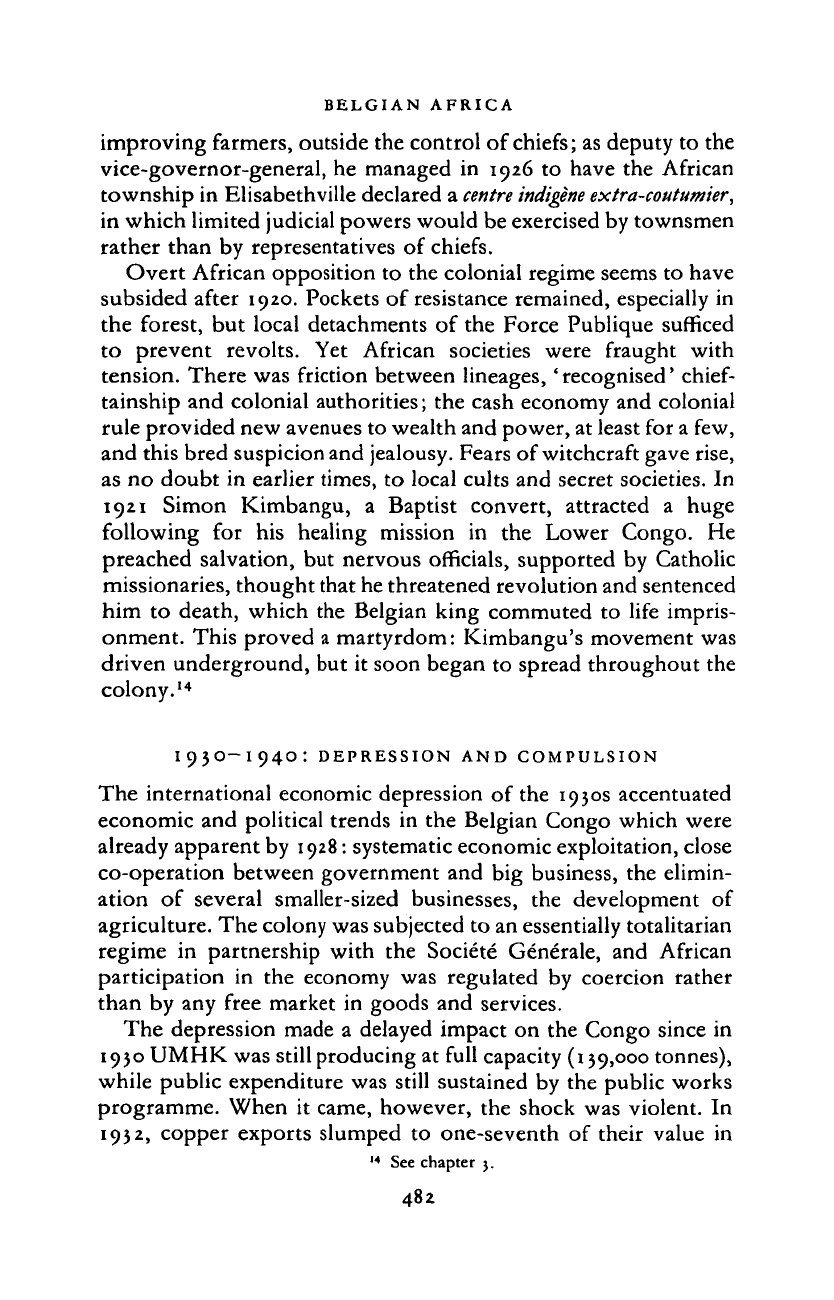
BELGIAN AFRICA
improving farmers, outside the control of chiefs; as deputy to the
vice-governor-general, he managed in 1926 to have the African
township in Elisabethville declared a
centre indigene
extra-coutumier,
in which limited judicial powers would be exercised by townsmen
rather than by representatives of chiefs.
Overt African opposition to the colonial regime seems to have
subsided after 1920. Pockets of resistance remained, especially in
the forest, but local detachments of the Force Publique sufficed
to prevent revolts. Yet African societies were fraught with
tension. There was friction between lineages, 'recognised'
chief-
tainship and colonial authorities; the cash economy and colonial
rule provided new avenues to wealth and power, at least for a few,
and this bred suspicion and jealousy. Fears of witchcraft gave rise,
as no doubt in earlier times, to local cults and secret societies. In
1921 Simon Kimbangu, a Baptist convert, attracted a huge
following for his healing mission in the Lower Congo. He
preached salvation, but nervous officials, supported by Catholic
missionaries, thought that he threatened revolution and sentenced
him to death, which the Belgian king commuted to life impris-
onment. This proved a martyrdom: Kimbangu's movement was
driven underground, but it soon began to spread throughout the
colony.
14
1930-1940: DEPRESSION AND COMPULSION
The international economic depression of the 1930s accentuated
economic and political trends in the Belgian Congo which were
already apparent by 1928: systematic economic exploitation, close
co-operation between government and big business, the elimin-
ation of several smaller-sized businesses, the development of
agriculture. The colony was subjected to an essentially totalitarian
regime in partnership with the Societe Generale, and African
participation in the economy was regulated by coercion rather
than by any free market in goods and services.
The depression made a delayed impact on the Congo since in
1930 UMHK was still producing at full capacity (139,000 tonnes),
while public expenditure was still sustained by the public works
programme. When it came, however, the shock was violent. In
1932,
copper exports slumped to one-seventh of their value in
14
See chapter 3.
482
Cambridge Histories Online © Cambridge University Press, 2008
